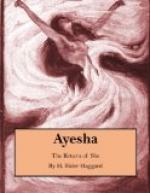“We answered that he lied when he said that this woman was immortal—for that was what we supposed he meant—since nothing is immortal; also we laughed at his tale of her power. This made the man very angry. Indeed he declared that our Buddha was not so strong as this priestess, and that she would show it by being avenged upon us.
“After this we gave him food and turned him out of the Lamasery, and he went, saying that when he returned we should learn who spoke the truth. We do not know what became of him, and he refused to reveal to us the road to his country, which lies beyond the desert and the Far Mountains. We think that perhaps he was an evil spirit sent to frighten us, in which he did not succeed.”
Such is a precis of this strange entry, the discovery of which, vague as it was, thrilled us with hope and excitement. Nothing more appeared about the man or his country, but within a little over a year from that date the diary of the abbot came to a sudden end without any indication that unusual events had occured or were expected.
Indeed, the last item written in the parchment book mentioned the preparation of certain new lands to be used for the sowing of grain in future seasons, which suggested that the brethren neither feared nor expected disturbance. We wondered whether the man from beyond the mountains was as good as his word and had brought down the vengeance of that priestess called the Hesea upon the community which sheltered him. Also we wondered—ah! how we wondered—who and what this Hesea might be.
On the day following this discovery we prayed the abbot, Kou-en, to accompany us to the library, and having read him the passage, asked if he knew anything of the matter. He swayed his wise old head, which always reminded me of that of a tortoise, and answered—“A little. Very little, and that mostly about the army of the Greek king who is mentioned in the writing.”
We inquired what he could possibly know of this matter, whereon Kou-en replied calmly—“In those days when the faith of the Holy One was still young, I dwelt as a humble brother in this very monastery, which was one of the first built, and I saw the army pass, that is all. That,” he added meditatively, “was in my fiftieth incarnation of this present Round—no, I am thinking of another army—in my seventy-third."[*]
[*] As students of their lives and literature will be aware, it is common for Buddhist priests to state positively that they remember events which occurred during their previous incarnations.—ed.
Here Leo began a great laugh, but I managed to kick him beneath the table and he turned it into a sneeze. This was fortunate, as such ribald merriment would have hurt the old man’s feelings terribly. After all, also, as Leo himself had once said, surely we were not the people to mock at the theory of re-incarnation, which, by the way, is the first article of faith among nearly one quarter of the human race, and this not the most foolish quarter.




